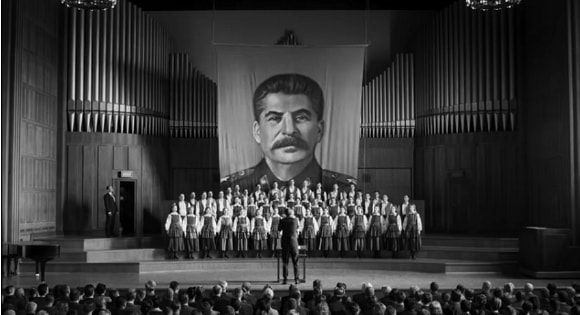Yearning
Thawing Cold Wars in the Heart
through Erotic Love and Music
"Yearning is the force field of desire that draws us to God. It grows out of our sense of incompleteness and our deep need for something more which we know can only be met by The More. It is characterized by a restlessness in our souls. We desperately want to move beyond the petty wants of the ego and break out of the self-constructed prisons that confine us...
Yearning draws out the mystic inside us as we sense the sacred presence in the world and feel one with all that exists. By attending to this desire, we realize that it also fuels our drive for sexual fulfillment. Yearning reveals the sacramental dimensions of erotic love and makes it one of the most enthralling experiences of life." -- Frederic and Mary Ann Brussat, Spirituality and Practice
Cold War (Polish: Zimna wojna)
a film directed by Paweł Pawlikowsk
TrailerA Scene |
"Cold War is a passionate love story between a man and a woman who meet in the ruins of post-war Poland. With vastly different backgrounds and temperaments, they are fatefully mismatched and yet condemned to each other. Set against the background of the Cold War in 1950s Poland, Berlin, Yugoslavia and Paris, it’s the tale of a couple separated by politics, character flaws and unfortunate twists of fate — an impossible love story in impossible times. Directed by Pawel Pawlikowski and starring Joanna Kulig and Tomasz Kot." Yearning as a Spiritual Value Music as Constant Comfort The Art of Discovering Connections God is in the Connections |
Process Theology and Defrosting
While watching the trailer for Cold War and reading the review of it by Micah Bucey in Spirituality and Practice, I began to wonder if the very idea of cold wars (externally between nations and internally within the heart) might be a good metaphor for understanding process theology. It would go like this.
While watching the trailer for Cold War and reading the review of it by Micah Bucey in Spirituality and Practice, I began to wonder if the very idea of cold wars (externally between nations and internally within the heart) might be a good metaphor for understanding process theology. It would go like this.
- Too often suffer from cold wars in the heart: a subjective frozenness in which are hearts are caked with ice.
- The ice is takes the form of "frustrated creativity, interpersonal tensions, and cramping confines of the ego." (Huston Smith in describing Buddhist dukkha.)
- The ice keeps us from enjoying positive connections with others and realizing our own subjective capacities for experiencing the wide range of healthy emotions: attention, amazement, compassion, hope, imagination, play, and zest for life.
- We do not willfully create the ice. It can be foisted upon uw. The cold wars of the heart can mirror the political circumstances in which we live.
- In melting the ice, worldviews -- new ways of framing things intellectually -- can help. We can lern to see all things as already-connected and to recognize the intrinsic value of all life. Still, they are not enough:
- Passionate love affairs can be occasions for a thawing of internal cold wars. They open the heart.
- Music can also an occasion for a thawing of internal cold wars. It, too, can open the heart.
- There is a religious side to passionate love affairs. Whatever is good and beautiful and holy is in the positive connections themselves and in the thawing.
- God is in the connections and the thawing: God is a cosmic defroster.
- God is also the Beauty in the other person, and in the relationship, but also beyond them that inspires the defrosting.





